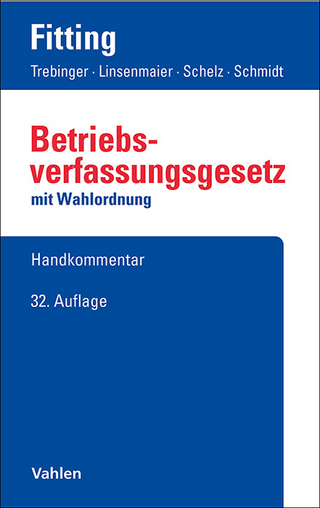
The Oxford Handbook of the Law of Work
Oxford University Press (Verlag)
978-0-19-287036-0 (ISBN)
At the core of all societies and economies are human beings deploying their energies and talents in productive activities - that is, at work. The law governing human productive activity is a large part of what determines outcomes in terms of social justice, material wellbeing, and the sustainability of both. It is hardly surprising, therefore, that work is heavily regulated.
This Handbook examines the 'law of work', a term that includes legislation setting employment standards, collective labour law, workplace discrimination law, the law regulating the contract of employment, and international labour law. It covers the regulation of relations between employer and employee, as well as labour unions, but also discussions on the contested boundaries and efforts to expand the scope of some laws regulating work beyond the traditional boundaries.
Written by a team of experts in the field of labour law, the Handbook offers a comprehensive review and analysis, both theoretical and critical. It includes 60 chapters, divided into four parts. Part A establishes the fundamentals, including the historical development of the law of work, why it is needed, the conceptual building blocks, and the unsettled boundaries. Part B considers the core concerns of the law of work, including the contract of employment doctrines, main protections in employment legislation, the regulation of collective relations, discrimination, and human rights. Part C looks at the international and transnational dimension of the law of work. The final Part examines overarching themes, including discussion of recent developments such as gig work, online work, artificial intelligence at work, sustainable development, amongst others.
Introduction
A: Fundamentals
1: Simon Deakin: Anthropogenic Labour Law: The Coevolution of Law and Work
2: Harry Arthurs: A Rose by Any Other Name: Work Law as the Law of Power
3: Brian Langille: The Contractual Lens
4: Supriya Routh: Postcolonialism and Labour Law
5: Tian Yan: The Development of the Law of Work in China
6: Adrian Goldin: The Development of the Law of Work in Latin America
7: Attila Kun: The Law of Work in Post-Socialist European Countries
8: David Cabrelli: Traditional Justifications of Labour Law
9: Virginia Mantouvalou: Advancing Human Rights, Capabilities, and Non-Domination at Work
10: Kate Andrias: Labour and Democracy
11: Stewart Schwab: Monopsony, Sticky Workers, and Bargaining Power
12: Hugh Collins: The Many Ideas of Labour Law
13: Guy Davidov: The Concept of Employee
14: Giovanni Gaudio & Jeremias Adams-Prassl: The Concept of the Employer
15: Antonio Aloisi & Miriam Cherry: Tertium Non Datur: Intermediate Employment Categories
16: Alan Hyde: Labour Law in Supply Chains
17: Kamala Sankaran: Informality at Work - Towards a Law of Livelihoods?
18: Andrew Stewart & Rosemary Owens: Work at the Intersection of Employment, Education, Training, and Volunteering
B: Core Concerns of the Law of Work
19: Joellen Riley Munton: The Managerial Prerogative and Variation of the Employment Contract
20: Kevin Banks: Good Faith Obligations in Employment Law
21: Mia Rönnmar: Fixed-Term and Zero-Hours Contracts
22: Kenneth Dau-Schmidt & Jozie Barton: Non-Compete Covenants
23: Cynthia Estlund: Waivability of Employment Rights: New Frontier or Road to Perdition?
24: Matthew Dimick: The Minimum Wage
25: Anne Davies: Working Time
26: Julia López López & Eusebi Colàs-Neila: Parental and Sick Leave: Talking About Inclusive Solidarity
27: Takashi Araki: Dismissals
28: Eric Tucker: Regulating Health and Safety in Capitalist Workplaces
29: Tess Hardy: Detection and Enforcement of Work Law Violations
30: Alan Bogg: Freedom of Association
31: David Doorey: Comparative Collective Bargaining Law
32: Flávia Máximo: The Right to Strike and Other Collective Actions
33: Frank Henderickx, Ilda Durri & Charalampos Stylogiannis: Worker Participation in the Enterprise
34: César F. Rosado Marzán: Alt Labour and Worker Centres
35: Llezlie L. Green: Race and the Workplace
36: Sophie Robin Olivier: Discriminations Concerning Hiring and Firing
37: Sandra Fredman: Effects-Based Discrimination: Beyond the Mirage?
38: Mark Bell: Accommodations
39: Hiroyo Tokoro: Equal Pay
40: Debbie Collier: Protection From Sexual Harassment
41: David Yamada: Protection Against Bullying
42: Alysia Blackham: Age Discrimination and Mandatory Retirement
43: Prabha Kotiswaran: Trafficking, 'Modern Slavery', and Forced Labour
44: Marta Otto: Privacy at Work and the Right to Private Life Outside Work
45: Catherine Fisk: Freedom of Speech at and Away from Work
C: International and Transnational Law of Work
46: Anne Trebilcock: The International Labour Organization and its Conventions
47: Marlese von Broembsen: The 'Decent Work' Agenda and the Developing World
48: Lance Compa: Trade Agreements and Labour Law
49: Adriana Topo: Transnational Unions and Labour Framework Agreements
50: Thierry Galani Tiemeni: Corporate Social Responsibility and Corporate Codes of Conduct
51: Janelle Diller: Multi-Stakeholder Initiatives (MSIs) and the Law of Work
52: Manoj Dias-Abey: Building Less Precarious Futures for Non-Citizen Workers
53: Vladimir Bogoeski: Posted Workers: Three Transformations of the European Posted Worker
D: Overarching Themes
54: Veena Dubal: The Legal Uncertainties of Gig Work
55: Valerio De Stefano: Online Work
56: Pauline T. Kim: Artificial Intelligence, Big Data, Algorithmic Management, and Labour Law
57: Shelley Marshall: Debates About the Role of Labour Law in Development
58: Tonia Novitz: A Sustainable Law of Work?
59: Ana Virginia Moreira Gomes & Anil Verma: Labour in the Time of Covid
60: Guy Mundlak: Six Paths for the 'Future of Work' Labour Law
| Erscheinungsdatum | 22.08.2024 |
|---|---|
| Verlagsort | Oxford |
| Sprache | englisch |
| Maße | 180 x 253 mm |
| Gewicht | 1832 g |
| Themenwelt | Recht / Steuern ► Arbeits- / Sozialrecht ► Arbeitsrecht |
| Recht / Steuern ► EU / Internationales Recht | |
| Recht / Steuern ► Öffentliches Recht ► Völkerrecht | |
| ISBN-10 | 0-19-287036-X / 019287036X |
| ISBN-13 | 978-0-19-287036-0 / 9780192870360 |
| Zustand | Neuware |
| Informationen gemäß Produktsicherheitsverordnung (GPSR) | |
| Haben Sie eine Frage zum Produkt? |
aus dem Bereich


